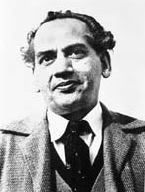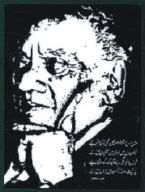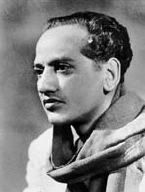Adil Najam
Today is the 25th death anniversary of Faiz Ahmed Faiz. Maybe we can remember him by sharing the verses from him that are most moving for us.
Pakistaniat readers are well aware of the aqeedat ATP has for Faiz Ahmed Faiz. Indeed, in some ways ATP started with a tribute to him and to the everlasting power of his words.
I think when we started this site my sentiment was “aaj baazar meiN pabajolaaN challo.” Today, more than three years later I find myself still engrossed in the same poem; but, maybe a little further into it, sometimes feeling like “phir humm he qatl ho ayeeN yaaro, challo.”
But that may just be the mood of the moment. What, in Faiz, are you thinking of dear readers. Share your favorite Faiz verse with us, please, and tell us what moves you about it.
Meanwhile, to get you rolling, let me repost from an earlier post I had done back in 2007 to mark Faiz Sahib’s birthday. In it I had highlighted a few of his works (including in his own voice) that were my particular favorites. Maybe, these will spur you into identifying yours:
It is always amazing that no matter what the issue, Faiz always has something to say that is not only relevant but revalationary (often it is also revolutionary).
Something that helps us express what we really feel but are unable to articulate. Something that helps us explain what we could not understand. Something that forces us to confront what we would much rather ignore. Something that rises above our fears and speaks to our hopes.
What, then, can one say about Faiz and Pakistaniat that Faiz Sahib has not said himself:
Nisar mein teri galiyoun pay aye watan kay jahaN
Chali hai rasm kay koee na sar uTha kay chalay
Jo koee chahnay waala tawaaf ko niklay
Nazar jhuka kay chalay, jism o jaaN bacha kay chalay
As always, I can offer no better tribute to Faiz Sahib than his very own words. So, here is my very own Faiz Mela for you. A selection of poetry from Faiz that has and continues to inspire me. Poetry that assumes new meaning every time I hear it. Poetry that speaks directly to the state of my existence, to the nuances of my aspirations, and to the core of my convictions.
First, these three poems, presented here in Faiz’s own voice, each of which is as much a credo for this blog as hum daikhain gay:
Nisar mein teri galiyoun pay…
[audio:http://lcweb2.loc.gov/mbrs/master/salrp/082 06.mp3]
Aaj baazar mein pa-bajoulaN chalo…
[audio:http://lcweb2.loc.gov/mbrs/master/salrp/082 14.mp3]
Bol…
[audio:http://lcweb2.loc.gov/mbrs/master/salrp/082 05.mp3]
A fourth poem that I would have added to this list is Intisaab. It has been most beautifully sung by Nayarra Noor, and I recently stumbled on this wonderful video based on part of that poem (I wish it had used the entire poem):
Along with Nayarra Noor, Tina Sani is someone who sings Faiz with a heartfelt passion and understanding; both, of course, are at their best when singing Faiz nazms composed by Arshad Mahmood. There are many Tina Sani renditions that are worth celebrating, but here is a relatively new one – on the poem mairay dil mairay musafir – which like everything above seems to speak personally to me (and to so many others). For those of us who are living in diyar-i-ghair, this is a particularly pertinent poem which is sung particularly well:
Of course, no Faiz Mela can conclude without Iqbal Bano singing Hum Daikhain Gay. Long-time readers of this blog know that ATP and its notion of Pakistaniat (also here) is inspired by Faiz and by this particular tarana of Pakistaniat. Our very first post was based on my own amatuerish effort to visualize that vision, and probably no one except Jinnah has been quoted more often at ATP than Faiz Ahmad Faiz. I have posted it a number of times since then. Let me please do so again. This time, not as much for my visualization as for Iqbal Bano’s wonderful rendition.
Yes, Lazim Hai Kay Hum Bhi Daikhain Gay:























































One of Faiz’s less quoted poems, because it is in Punjabi, is titled “Rabba Sachya”. It’s simple but profound. Here are a few lines, loosely translated and paraphrased:
O truthful Lord, You had said
“Go, you are the king and my deputy on the land”
….
Lord, I don’t need any kingdom
All I need is a living, with dignity
I don’t pine for palaces and mansions
All I need is a small place that I can call my own
If you fulfill that little wish of mine,
I promise to accept all your commands
If not, then I better find someone else to beg and beseech
What a concidence, when I opened this post I was reading faiz, and I was on the following :
Aur kuch dair na guzray shab e furqat say kaho
dil bhi kum dukhta hai, woh yaad bhi kum aatay hain
Of Urdu poetry’s undying greats, various poets are taken into account for different things. While Ghalib is legendary for his pining and bathos, Iqbal for his patriotism, fervour and elevation to the status of the national poet, Faiz Ahmed Faiz is, nonetheless, remembered as a revolutionary on the 25th anniversary of his death. He was really a humanist in the best sense of the word, and his poetry was free of any prejudice, racial or religious.
He was drawn into the charmed circles of Lahore’s Aesthetes Club and later, the Progressive Writers Movement, as his genius was recognized early, Though, he started his early schooling at a madressah, he surprisingly and progressively became more involved with the Communist Party of Pakistan, after Masters Degrees in English and Arabic Literature.
Faiz’s politics was greatly inclined towards the Bolshevik Revolution, like many of his contemporaries.
Faiz also served in the British Army’s Information department in World War II. His final posting saw him heading the propaganda department in Singapore. Soon after his discharge, Pakistan came in to being in the map of the Subcontinent.
After partition, he decided to stay on in Lahore, where he distinguished himself as a journalist and edited the Pakistan Times as well as the Adab-e-Latif and Lail-o-Nihar.
But an iconoclastic leftist and an apostate were not easy things to be in newly independent Pakistan. He was soon charged with treason and imprisoned for complicity in the Rawalpindi Conspiracy Case. But Faiz’s years at Hyderabad Jail brought out some of the greatest poetry he ever wrote. Dast-e-Saba and Zindaan-Nama, two of his most acclaimed works, were produced during this period. He continued to write poetry through the 70s and early 80s and won the Lenin Peace Prize, the Lotus Award and several honorary doctorates. Other notable recipients include Pablo Neruda, Nelson Mandela, W. E. B. Du Bois, Bertolt Brecht, Fidel Castro and Nobel Prize winning Chemist Linus Pauling. The real award for a poet is the love and appreciation of his fans and Faiz enjoyed both for most of his life. He recorded for the Library of Congress in 1977 which has fifty two works by him.
Before his death in 1984 he was also nominated for the Nobel Prize.
There were many grave incongruities in his personality. He championed the cause of the poor and disenfranchised through his poetry, but enjoyed the life of a wealthy man with a penchant for fine Scotches. He believed passionately in communism, but fraternized easily with the social and industrial elite. President Ayub Khan decided that the best way to destroy Faiz’s spirit was to give him power. He appointed him President of the National Council of Arts and gave him a state bungalow. Soon Faiz succumbed to the ease of life and the pleasures of the bottle. In a chilling last poem, it seemed as though he had a premonition of his death:
Ajal key haath koi aa rahaa hai parwaana
Na janey aaj ki fehrist mein raqam kya hai
[Death has some ordinance in its hand,
Alas, I don’t know whose names are on the list today]
Khaled Ikbal,
Rawalpindi
One of my favorites that applies to Pakistan today and all teh bombings:
inn damaktay hooaye shehrouN ki farozaan makhlooq
kyouN faqat marnay ki hasrat may jeeya karti hai
Some comments from the ATP Facebook Page:
– “mere chara gar ko naveed ho,saf-e-dushmanan ko khabar kro
jo wo karz rakhte thay jaan per wo hisaab aaj chuka diya
jo rukay to koh-e-giraan thay hum,jo chalay to jaan se guzar gaye
rah-e-yaar hum ne kadam kadam tujhe yaadgaar bana dia!”
– “I’m not sure if this is my favorite, but I like the boldness of it:
jinka deen pairavii-e-kazbo-riyaa hai unko
himmat-e-kufr mile, jurat-e-tahaqiiq mile ”
– “nisar me teri galiyon py ay watan k jahan
chali hai rasm k koi na ser utha k chaly
jo koi chahny wala tawaf ko jaye
nazr jhuka k chalyjism-o-jan bacha k chaly
hai ahle-dil k liye ye nazam-e-basto–kushad
k sango khisht mukayiadhein or sug azad”
– “one of the great urdu poets of all times…need i say more”
– “da gr8 gr8 gr8 poet.
Jis dhuj se koi maktal main gaya,wo shaan salamat rehti hai
Ye jaan tu aani jaani hai,is jaan ki tu koi baat nahi
Medaan-e-wafa darbaar nahi,yahan naam o nasab ki pooch kahan
Aashiq tu kisi ka naam nahi,kuch ish kisi ki zaat nahi.
wah wah”
– “Karo Kuhj Jabee(n) pe sarr-e-kafan, mere qatiloo ko guma(n) na ho……
K gharoor-e-Ishq ka bankpan, pass-e-marg hum ne bhula diya.”
– “BOL K LAB AZAD HAIN TERE (English Translation).
Speak, your lips are free.
Speak, it is your own tongue.
Speak, it is your own body.
Speak, your life is still yours.
See how in the blacksmith’s shop
The flame burns wild, the iron glows red;
The locks open their jaws,
And every chain begins to break.
Speak, this brief hour is long enough
Before the death of body and tongue:
Speak, ’cause the truth is not dead yet,
Speak, speak, whatever you must speak.”
– “jinka deen pairavii-e-kazbo-riyaa hai unko
himmat-e-kufr mile, jurat-e-tahaqiiq mile”
– “متاع لوح و قلم چھن گئ تو کیا غم ہے
کہ خون دل میں ڈبو لی ہیں انگلیاں مں نے
زباں پہ مہر لگی ہے تو کیا کہ رکھ دی ہے
ہر ایک حلقہءزنجیر مں زباں میں نے”
– “dasht-e-tanhaai mein,
ai jaan-e-jahaan, larzaan hain
teri avaaz ke saaye,
tere honthon ke saraab
dasht-e-tanhaai mein,
duri ke khas-o-khaak tale
khil rahe hain tere pehlu ke saman aur gulaab
uht rahi hai kahin qurbat se
teri saans ki aanch
apani khushbuu mein sulagti hui
maddham maddham
dur ufaq par chamakati hui
qatra qatra
gir rahi hai teri dil daar nazar ki shabnam
is qadar pyaar se hai jaan-e jahaan rakkhaa hai
dil ke rukhsaar pe
is vaqt teri yaad ne haath
yun guman hota hai
garche hai abhi subah-e-firaaq
dhal gaya hijr ka din
aa bhi gaye vasl ki raat”